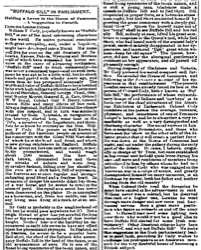Title: "Buffalo Bill" in Parliament | Holding a Levee in the House of Commons—A Suggestion to Parnell
Periodical: Kansas City Star
Date: June 1, 1887
More metadata
"BUFFALO BILL" IN PARLIAMENT.
Holding a Levee in the House of Commons—A Suggestion to Parnell.
William F Cody, popularly known as "Buffalo Bill," is one of the most interesting characters in the world. He unites personal comeliness with great intrepidity, and, under a Napoleon, might have developed into a Murat. His name will live for ever on the old frontiers of Nebraska, Kansas, Dakota, Wyoming and Montana--all of which have witnessed his heroic services in the cause of advancing civilization. "Buffalo Bill" used to drink occasionally--he was never a confirmed toper--and on such occasions he was apt to be a little wild, but he shook hands and parted with whisky years ago, and since then he has prospered amazingly. The worth and valor of Buffalo Bill have been testified to by such high military authorities as Lieutenant General Sheridan, General George Crook, General Wesley Merritt, General E. A. Carr, Colonel W W Royal, Colonel Guy V Henry, Colonel Anson Mills and many others of less rank. Always dignified, Buffalo Bill treated the officers with due respect, and in turn was similarly treated by them. Nebraska, in recognition of his bravery, elected him, some time in the '70's, a member of the Legislature, and therefore he is know by courtesy as the Hon. William F Cody. His person is well known to millions of the American people on account of his connection with the Great Wild West show, of which he is the head and front, and which is now giving exhibitions in England. Buffalo Bill is about six feet one inch in stature, is perfectly proportioned, and would weigh about 200 pounds. His hair is dark brown, illuminated here and there by streaks of auburn and worn long in cavalier fashion, falling over his shoulders. His eyes are dark hazel, full of expression. His features are at once regular and strong--indicating good blood and a fearless heart. In moments of danger his nostrils dilate like those of a war horse, and he seems to revel in the sense of peril. His equal as a scout has never been discovered on the plains. He is unrivalled as a horseman, and, from his saddle, can beat any living man firing at a mark or at an animal.
Mr Cody is probably in the neighborhood of 50, but he would pass anywhere for 35. Not a single thread of gray has yet invaded the long hair or the sweeping moustache of this border knight. Neither time nor the hardship he encountered in early life seems to have any effect upon his phenomenal physique. In England, as in America, he seems to be a popular hero. Red-shirt, the chief of the Indians who accompany Buffalo Bill in the land of the Saxon, is an old acquaintance of ours. He is one of the finest living specimens of the Sioux nation, and is still a young man. Gladstone made a speech to Buffalo Bill and to Red Shirt. Bill responded in proper form, as a Nebraska statesman ought, but Red Shirt contented himself by greeting the great commoner with a deeply guttural "How." Queen Vic herself came out of her "royal" shell to see Buffalo Bill and his red ally. Bill, entirely at ease, lifted his great sombrero in response to the Queen's nod, while Red Shirt, who had heard much of the ancient lady's power, seemed entirely disappointed in her appearance, and muttered "Ugh! great white woman--heap fat old squaw!" The Queen, however, did not hear the aboriginal gentleman's comment on her appearance, and all passed off pleasantly enough.
Having disposed of Gladstone and Victoria, Mr Cody pursued his social conquest still further. He invaded the House of Commons, and following is the Freeman's account of his appearance in that establishment. "The present London season has already found its lion in the person of Colonel Cody, better known as "Buffalo Bill," the performance of whose extraordinary troupe of red Indians and 'cowboys' is to form one of the chief attractions of the American Exhibition at Earlscourt. Colonel Cody combines in his person the courage, romance, physique, and comeliness of one of Fenimore Cooper's heroes, and he is altogether a very remarkable as well as a very distinguished and charming character. His social success in London is something tremendous, and those who have seen his show on the other side of the Atlantic predict that it will create a perfect furor. He was down at the House of Commons last night, and sat under the gallery during the early part of the debate. He came, I believe, originally in charge of Mr T[unreadable], but once established in his corner seat he held quite levee during his stay--all sorts and conditions of members being introduced to him by others whom he had met before. Colonel Cody who was engaged in the American war in a corps of scouts, and greatly distinguished himself on many occasions, is an Irishman by decent, both his father and mother hailing from the old country." [1]
When Colonel Cody read the foregoing he must have smiled at his advancement in rank. William never was a colonel, but he deserved that rank or a higher one, because he went through more danger and saw more real hair-raising service than a great many gentlemen who figure as colonels on and off the army list. As Parnell may need some fighting men over there why would it not be a good idea to have Buffalo Bill elected for some Irish constituency? Other American citizens have been so elected, and why not Buffalo Bill? We make this suggestion to the Irish parliamentary leader in good faith, providing Mr Cody wishes to exchange his prerogative as an American monarch for the very doubtful honor of becoming a British subject.
Note 1: William F. Cody's lineage was through European descent; however, there is no evidence for any Irish roots. [back]
Title: "Buffalo Bill" in Parliament | Holding a Levee in the House of Commons—A Suggestion to Parnell
Periodical: Kansas City Star
Date: June 1, 1887
Topics: Buffalo Bill's Wild West in Britain
Keywords: American frontier American Indians Buffalo Bill's Wild West Company Earl's Court (London, England) Firearms Frontier Horsemanship Horses Military men Scouts (Reconnaissance) Shooting Sioux Whiskey
People: Carr, E. A. (Eugene Asa), 1830-1910 Cooper, James Fenimore, 1789-1851 Crook, George, 1829-1890 Gladstone, W. E. (William Ewart), 1809-1898 Henry, Guy Vernor, 1839-1899 Merritt, Wesley, 1834-1910 Mills, Anson, b. 1834 Murat, Achille, 1801-1847 Parnell, Charles Stewart, 1846-1891 Red Shirt, 1845?-1925 Royall, William B. (William Bedford), 1825-1895 Sheridan, Philip Henry, 1831-1888 Victoria, Queen of Great Britain, 1819-1901
Place: London (England)
Sponsor: This project is supported in part by a grant from the National Endowment for the Humanities and the Geraldine W. & Robert J. Dellenback Foundation.
Editorial Statement | Conditions of Use
TEI encoded XML: View wfc.nsp00795.xml
Back to top
